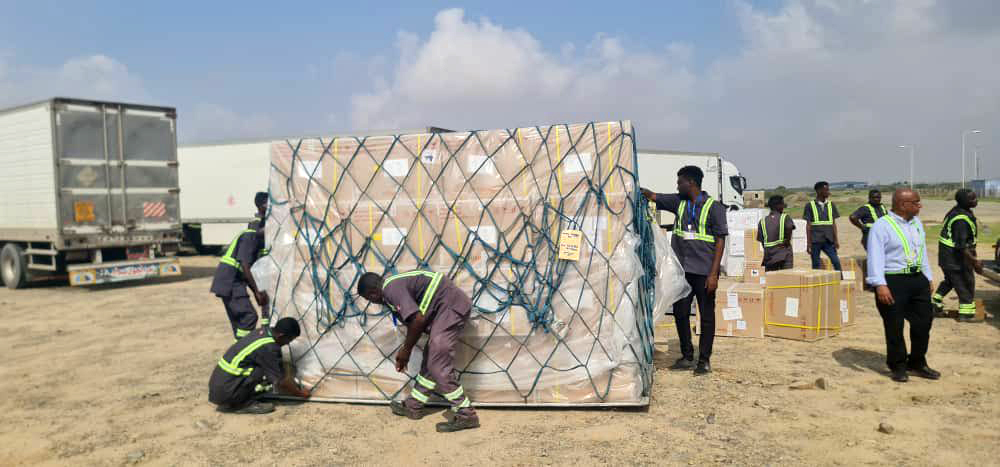Cholera, dengue fever, and malaria spreading further in Sudan

Vaccines arrive in Port Sudan on November 14, 2023 (File photo: UNICEF)
Sudan’s Federal Emergency Operations Centre yesterday reported new cases of cholera and dengue fever in a number of states in the country. More than 10,700 suspected cholera cases were documented last month. Malaria is rapidly spreading in northern Sudan.
In its latest weekly meeting in Kassala, eastern Sudan, yesterday, the Federal Emergency Operations Centre also reviewed “the report about the second phase of the vaccination campaign against cholera and the implementation of the campaign for disease vector control and environmental sanitation”.
Regarding the cholera vaccination programme, Nadir Hammad, representative of the Expanded Immunisation Programme, said that the second round was carried out in three localities in Red Sea state, two localities in Kassala, and one locality in the White Nile state in early February. He noted that 98.9 per cent of the target number was reached: 1,867,157 people received a cholera vaccine between February 7-12.
The meeting also discussed the alarming spread of malaria in northern Sudan and decided to send a team of experts to the River Nile state and Northern State to investigate the situation.
The health officials also agreed on the preparation of a list of emergency needs for the rainy season that starts around May in the southern parts of Sudan and reaches the north of the country about one to two months later.
The World Health Organisation (WHO) will provide financial and technical support for community health surveillance training in the two northern Sudanese states.
Displaced
The International Organization for Migration (IOM) Displacement Tracking Matrix reported on March 12 that the war that erupted between the Sudanese army and its paramilitary counterpart, the Rapid Support Forces (RSF) 11 months ago, has displaced at least 6,326,416 individuals (1,261,060 households). An estimated 1,884,909 others fled to neighbouring countries. Many of them have been living in dire conditions in makeshift shelters for months.
The acting director of the Health Emergencies and Epidemic Control Department of the federal Health Ministry, Mohamed Mahmoud, said at the meeting in Kassala that a central person has been assigned to work on the “displaced people’s file” of the emergency department, which includes a follow up on the health conditions in the shelter centres, collection of information about the numbers of displaced in the centres, provide health services, in cooperation with the local authorities.
According to the UN Office for the Coordination of Humanitarian Aid (OCHA) in Sudan last month that suspected cholera cases continued to increase, with more than 10,700 cases, including 292 associated deaths, as of February 17.
In an earlier report this year, OCHA warned that “Disease outbreaks are increasing in the face of disruptions of basic public health services, including disease surveillance, functioning public health laboratories and rapid response teams.
“In addition, insecurity, displacement, limited access to medicines, medical supplies, electricity, and water continue to pose enormous challenges to delivering health care across the country.”
About 65 per cent of the population lack access to healthcare, and between 70-80 per cent of the hospitals in conflict-affected areas are no longer functional, the UN humanitarian agency stated.
Radio Dabanga reported in November last year that a consignment of 7.5 million doses of measles rubella vaccination and 2.2 million cholera vaccines arrived to Port Sudan, after the International Coordination Group on Vaccine Provision approved the Sudanese Ministry of Health’s request to provide more than 2.9 million doses of oral cholera vaccines to be used in nine localities in El Gedaref, El Gezira, and Khartoum.











 and then
and then